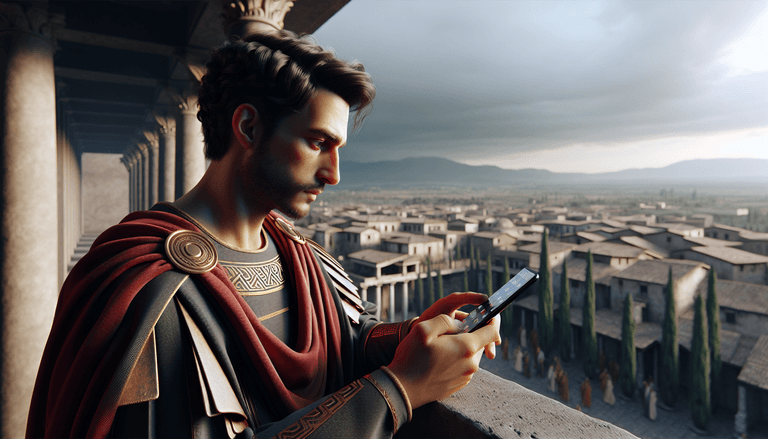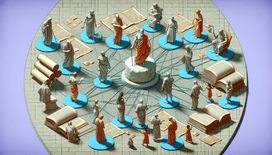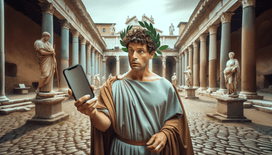Picture, if you will, a rather more connected ancient world. The year is 336 BC, and a young Alexander, just crowned king, is poring over maps like a jigsaw puzzle, trying to piece together his enormous ambition of conquering the known world. The sweaty Macedonian soldiers, meanwhile, are tuning their lyres and sharpening swords. But wait! Lurking amongst these historical halls is a modern marvel – a smartphone! Now, before we start swiping down the annals of history with our imaginations, let's just appreciate the irony of Alexander the Zoomed-in Great.
A Selfie a Day Keeps the Drachma in Play
Imagine Alexander taking a break from battlefield strategies to snap a selfie atop the winged statue of Nike. His Instagram would be ablaze with fans from Pella to Persepolis. '#ConqueringIt,' he might caption, collar ever-so-casually popped. After all, why rely on oral stories about your greatness when you can simply post a thousand words-worthy picture?
The Macedonian army, feeling a bit more like a historical hiking club under Alexander's leadership, would have their share of moments in the digital sun, too. Photos from the Battle of Issus shared directly to messenger groups: "Check out that phalanx formation, mum!" Suddenly, recruitment becomes rather easier. Who wouldn’t want to join an army that's racking up likes and comments like they’re Persian territories?
Texting Tactics: Because Who Needs Homing Pigeons?
What, precisely, does one do with a smartphone when seated in the tactical tent, generals surrounding with quills poised? Send them texts, of course! Instead of trying to shout over the clatter of armour, Alexander could text his orders in a handy group chat: "Forward to Gaugamela, and don’t forget your sandals this time." Emojis would surely revolutionise military strategy. A tiny warhorse emoji, a helmet, or perhaps a strategically placed fire symbol would add clarity that even the most eloquent of Socratic speeches would struggle to match.
Additionally, the ability to check the weather or get news alerts on enemy movements would offer a tactical advantage greater than a hundred elephants in the field. Who knew rainfall could ruin such a meticulously planned invasion? Well, present-day meteorologists with gadgets at their disposal, of course.
Whispering Gale: The Google Wind
Now, be honest, how often have you wished for more than pebble-tossed secrets from the oracle at Delphi? With a smartphone, the gods’ wisdom is just a Google search away. Faced with perplexing dilemmas like whether to invade India, Alexander might just type: "Should I dare cross the Hyphasis, or is it too much of a pie in the sky?"
The wealth of online information would surely rival that of the most lavish Anatolian treasury. Strategy lessons from Sun Tzu and Machiavelli trending in his recommended reads; tips and hacks to conquer 101 civilisations, written by none other than Khan B. Gone, a seasoned reviewer of hacks in the conquest genre.
Alexander, His Life: Live
Far be it from us to overlook the power of livestreaming. Twitch streams of pitched battles could make modern eSports tremble in their digital boots. The siege of Tyre could have been Sponsor's Choice on whatever-the-equivalent-of-YouTube-would-be for ancient battle livestreams. "Next up, trebuchet techniques and how to outflank with flair," he’d announce.
Information could be disseminated faster than armies could march. Darius III of Persia might have found out about Alexander’s strategic flank manoeuvres before his own runners broke a sweat. With real-time updates, Alexander could adapt, make instant decisions and react much faster than traditionally possible. We can only imagine how many 'buffering' jokes would round out the livestream glory as WiFi tried to catch up with history in motion.
The Great Un-Friender
Lastly, let’s talk about friendship – the strategic kind, filled with alliances and betrayals. With a smartphone, Alexander's network would expand from merely strategic marriages to includes LinkedIn connections and Facebook friend lists. Business proposals from the most unexpected historical figures might slide seamlessly into direct messages. “Plato has sent you a friend request. Also wants to discuss the concept of ideal vs. actual governance. Accept?"
It stands to reason that a savvy king like Alexander could control the narrative with just a few choice posts and strategic unfriendings when necessary. Maybe even a carefully worded status update or two: "Macedonian prince seeks new territories. Recommendations?" The digital world would be his oyster – or perhaps, his Grecian urn.
In conclusion, armed with a device as powerful as his ambition, Alexander the Great would likely have fast-tracked his world dominion, leaving us with scrolls of DMs and role models for marketing gurus everywhere. His life, ever larger than life, documented one byte at a time.







